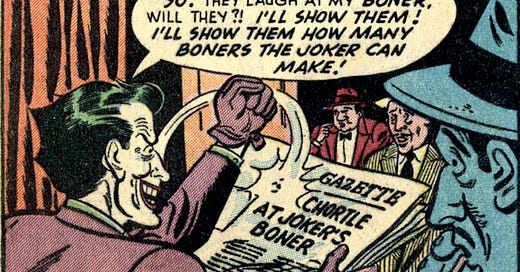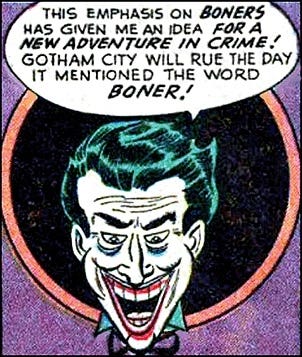It’s not often that we break format here, but I decided there is a need for a special issue, and if you were a regular listener to ‘80s All Over, you might already have some idea what we’re doing here.
That’s right. Boners have been pulled. Twelve of them, in fact.
I know, I know, I’m 54 years old, but it still makes me snicker that making a mistake used to be called pulling a boner, and I figure if you can’t laugh about your mistakes, that might be a problem. After all, this is a film criticism research project, not open-heart surgery on the President in the middle of a World War. The stakes here are relatively low, and thanks to the magic of editing, I can go back and add things or correct things later if I have to.
I have been working on this project, in one form or another, for at least six years now, and I am still finding clarifications or new information, and as a result, mistakes have been made. So far, those have just been mistakes of omission, and now that I’ve reached ten films that I neglected to include on the dates they were released, I figured I’d back up and send you a special issue with a dozen films that would have been released in 1980 and 1981. If you go back and look at the archives for these issues, you’ll see that these reviews have already been added there. However, if you look at the issues you were sent in your inbox when I first published those months, those reviews are nowhere to be found. Magic!
Even once I make it to December 1989, I will always want to keep this website up and keep it updated with any new information that comes up. I would like to create the best one-stop research tool for every single film released in the ‘80s, and I don’t look at this kind of correction as a pain or a burden. I love it when I learn something new or pin down some release I’d never heard of because I know I’m one step closer to doing this job right and getting the project finished.
In fact, I’d like to talk about methodology, because that’s one of the reasons you’re reading these twelve reviews. When I started working on this project in its initial incarnation as ‘80s All Over, one of the reasons it felt like such a good idea is precisely because there was no single resource we could turn to as research. There is no good comprehensive list of all of the theatrical releases of the decade, in order, with all of the dates correct. And even if there were, there is no place to watch a surprising number of these films anymore. It’s not a question of whether you do or don’t want to pay for them. They are simply not in circulation and they haven’t been for years in many cases. There are so many different reasons, and so many different companies that don’t exist anymore, and ownership issues on some of these films have become entangled. Music rights can make things complicated even for films that studios would like to release. As we prepared to put our first few episodes together, I was immediately amazed by how hard it was to find some of the films.
In mid-November of this year, I finally added the last handful of titles I’d been searching for to the Plex server that I started specifically to create a digital reference library I could refer to for the podcast. Even after the podcast ended, though, I kept refining the list that I built, adding new titles, correcting information that the show got wrong. By the time I started this newsletter, I felt like I had enough of the films here that I’d be able to fill in the gaps by the time I would need things. I had made connections with collectors and archivists who all had specific interests and knowledge that helped me track titles down. All told, I’d say it was almost six years of effort to find the 2800 or so titles that I’ll be reviewing before this newsletter is finished. Hell, when I started, I didn’t even know what a Plex server was. All I knew was there were too many films that were not available either online or physically, and there’s no way to do this newsletter properly if you can’t actually see the films.
A lot of what I have is in dubious quality. Some of these titles were never issued in any format after VHS. Some of them have only ever aired on cable. I would argue that there are very few other places aside from my server and a few other private servers where every single one of these films have been collected together. At this point, this is a piece of cultural history that feels like it has a value larger than something monetary. When you look at these films in order, you can see the evolution of the entire industry, both here and abroad. The 1980s were a pivotal decade for studio films and for independent cinema as well. If you love the ‘70s, it is fascinating to watch the way that decade’s adventurous spirit continues to resonate through the ten years that came right after, and if you’re a fan of the ‘90s, it’s amazing to watch all of the seeds get planted that eventually bloom into one of the richest independent explosions the industry has ever seen.
The reason I remain dedicated to finishing this project is because of just how passionate the responses have been from people who discover the podcast or the newsletter, and they read a review for something they had forgotten completely and they are immediately transported back time to some video store where they saw the box on a shelf or some lazy afternoon when they stumbled across it on HBO or the SuperStation. I am an archivist. I am an archaeologist. I feel like this is so much more rewarding to write than reactions to brand-new films, and I appreciate all of you who continue to support this project.
With that said, my first mistake was in the first issue, and ten of my mistakes took place in the first year of the project. Let’s hope I can keep that number much lower as we move forward, and let’s grab that first boner and get this going!
1980
JANUARY 11
The Godsend
Malcolm Stoddard, Cyd Hayman, Angela Pleasance, Patrick Barr, Wilhelmina Green, Joanne Boorman, Angela Deamer, Clarissa Young, Lee Gregory, Piers Eady, Anna Wing, Artro Morris, Hilary Minster, James Snell, Corinne Skinner-Carter, Jonathan Elsom, Bernard Taylor
cinematography by Norman Warwick
music by Roger Webb
screenplay by Olaf Pooley
based on the novel by Bernard Taylor
produced by Gabrielle Beaumont
directed by Gabrielle Beaumont
Rated R
1 hr 33 mins
An abandoned newborn is taken in by the Marlowe family, but tragedy plagues them from the moment they bring her home.
Gabrielle Beaumont is famous for many things, and justifiably so. She was the first woman to direct a Star Trek episode. She was Emmy-nominated for her work as a director on Hill Street Blues. She was the person who pushed to cast Joan Collins in Dynasty. She made the other Dorothy Stratten film in the ‘80s, the one with Jamie Lee Curtis. But in 1980, she made her feature debut with a film adapted by her screenwriter husband Olaf Pooley from a Bernard Taylor novel, and the result was a startlingly mean-spirited killer kid movie that is largely forgotten today.
This is one of those sub-genres that never really breaks out, but every now and then, one of these movies makes just enough noise to inspire a few imitators. The Godsend feels like it was made because of the success of the Omen films. Produced independently in the UK, the film was released in the US by Cannon, and they sold it fairly accurately. My guess is that the reason you don’t know this film immediately is because it’s a genuinely nasty bit of business, a story about a supernatural cuckoo who drops a chaos agent into the lives of the the Marlowe family to deadly effect. The movie is pretty much a blunt object. There is nothing subtle about it. When we meet the Marlowes, they’re all out as a family. There’s Alan (Malcolm Stoddard) and Kate (Cyd Hayman) and their four children, but not for long. After an encounter with a strange pregnant lady (Angela Pleasance, daughter of legendary character actor Donald Pleasance), they bring her back to their home. She ends up giving birth and then taking off. For some insane reason, Kate wants to keep the baby, and almost as soon as baby Bonnie becomes part of their family, their own baby ends up dead in his playpen.
As Bonnie gets older, mysterious accidents continue to plague the other Marlowe children, killing them off one by one, and Bonnie is always right there in the midst of things. For some reason, Alan and Kate are too stupid to do the math. It is a shockingly linear story, and it does feel like a singular riff on the entire idea of the “killer kid” movie. For the most part, the kids in these films kill off adults for one reason or another. Not Bonnie. Her sole purpose seems to be the destruction of every actual Marlowe child and then, eventually, the destruction of the family itself. The film ends on an ugly bleak note, which makes it feel more like a hangover from the ‘70s than any kind of ‘80s movie. On a technical level, this feels like a television film, and that probably shouldn’t be a surprise. As I said, Beaumont is a legendary TV director. This is not a bad film or an incompetent one, but it is cheap and it does feel like something that was shot fast. If you like your horror bleak and nasty, you might like this slow-burn slice of mean, but it’s largely forgettable fare overall.
Keep reading with a 7-day free trial
Subscribe to The Last '80s Newsletter (You'll Ever Need) to keep reading this post and get 7 days of free access to the full post archives.






